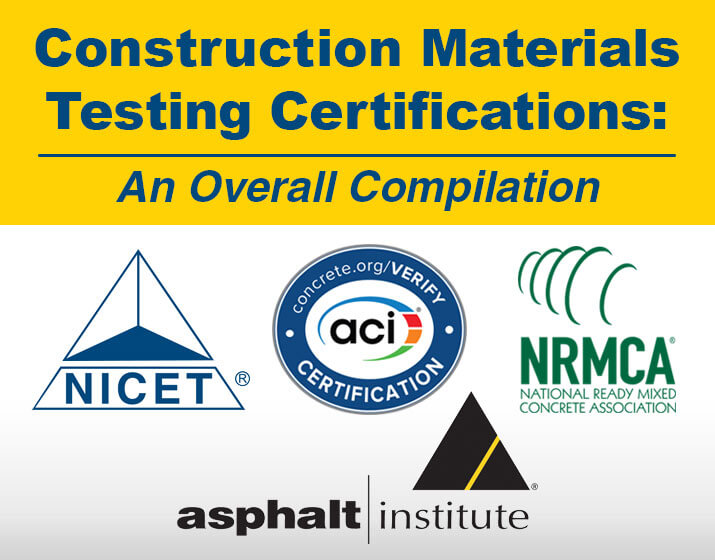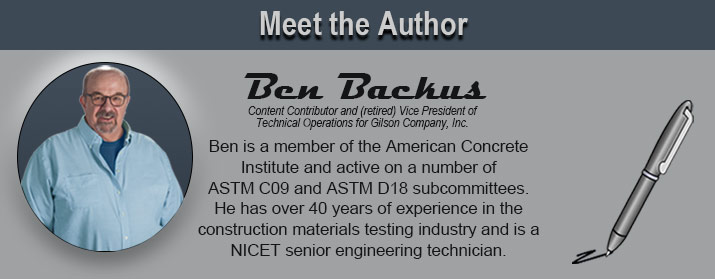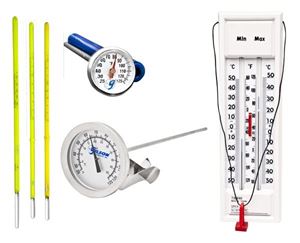
There have been a few changes in the industry over the past few years, and this final blog includes new information, updates, and additional resources we've learned about. We are also summarizing a few key take-away points. Finally, this blog post links later to a PDF file of online resources with useful information related to the certification, study materials, examinations, and more.
Points to Remember:
- Certification offers value. Whether earned through the American Concrete Institute (ACI), Asphalt Institute (AI), National Institute for Certification in Engineering Technologies® (NICET), or the National Ready Mixed Concrete Association (NRMCA), a technician certification indicates more than a passing score on the written and/or performance exam. It also shows the industry that you have gained additional expertise and skills that strengthen your value in the workforce and career. It gives you that competitive edge, especially with state and federal government entities which must align with the Federal Highway Administration's Code of Federal Regulations, 23 CFR, Part 637 when awarding contracts.
- There is often a progression of higher-level certifications that must be followed from the lowest rung to the highest. NICET certifications are a perfect example, as this organization offers programs in asphalt, concrete and soils certifications with specific designations starting at Level I Technician in Training and progressing to Level IV Senior Engineering Technician.
- Prepare for and test through a recognized state or national entity. Along with those listed above, numerous other industry-recognized organizations offer training/study materials, preparation classes, and testing for certification and recertification. This group includes the National Center for Asphalt Technology (NCAT) at Auburn University, state Departments of Transportation (DOT), colleges and universities – which often partner with their state DOT, ASTM, and AASHTO, National Asphalt Pavement Association, the Federal Highway Administration, National Highway Institute, and more. Keep in mind that your years of experience may not be all you need to get that certification. It's important to prepare sufficiently and thoroughly as the certification exams are detailed and may include both a written and hands-on performance component.
Here's What's New:
- The American Concrete Institute (ACI) established a new technician certification category, the Concrete Quality Technical Manager (CQTM), and the Associate Concrete Quality Technical Manager (ACQTM). These certifications are geared to those industry professionals considered a "specialist" or "expert," possibly a materials scientist or mixture design manager as explained in Concrete International.
- Asphalt Institute (AI) has dates and locations scheduled for the three-day National Binder Technician Certification Program. The program includes a review of course materials and written and laboratory practical examinations. An application form must be filled out to register for any of the dates.
- The National Institute for Certification in Engineering Technologies (NICET) has fully implemented its certification process through Standard Model/Computer-Based Testing (CBT). NICET has redefined designations for its concrete, asphalt, and soil certification programs. The designations shown below are the same for concrete, asphalt, and soils technician certifications.
- Level I: Technician Trainee
- Level II: Associate Engineering Technician
- Level III: Engineering Technician
- Level IV: Senior Engineering Technician
- AASHTO's Technical Training Solutions has numerous programs and resources to use in pursuing a construction materials technician certification in a number of related disciplines. Additionally, AASHTO provides links to many industry partners and additional training resources
It's worth repeating that there is a benefit to checking out local universities and any partnerships with their respective state Departments of Transportation (DOT). There have been articles recently in industry publications indicating that some colleges now offer road construction technician certification courses as part of the curriculum to help offset worker shortages that exist within some areas of the country.
As stated earlier, a Resource List of useful websites is available in PDF format, which allows for downloading or direct clicking to each site included in the list.
In closing, we hope the information provided through this series over the past several months has been useful and relevant in the pursuit of achieving a technician certification and advancing your career.
Gilson Is Here to Help
Contact our testing experts for more information or to discuss your testing application.
Testing Resources
Standard Test Methods, Specifications, and Practices
Individual test methods and specifications referenced in our product descriptions, blog articles, and videos are available for review or purchase from the professional organizations noted.
- ASTM International (American Society for Testing and Materials)
- AASHTO (American Association of State Highway and Transportation Officials)
- ACI (American Concrete Institute)
- State DOTs (Departments of Transportation)
- ISO (International Organization for Standardization)
- BS (British Standards)
- EN (European Standards)

















